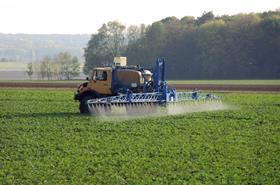
The Soil Association has disputed claims by Syngenta’s CEO that shunning pesticides will lead to food shortages.
J Erik Fyrwald, head of the world's largest pesticide manufacturer, said in an interview with The Guardian on the weekend that shunning GM crops, pesticides and technology will have serious consequences within 20 years for the world's population, estimated to now peak at 9.8 billion by 2050.
Fyrwald said: “If we don’t keep getting better with technology that helps feed the world with less greenhouse gas emissions, I think we are going to have food availability issues and the climate is going to get much worse from agriculture. There could very well be, 10 to 20 years from now, significant issues around feeding the world.”
He added that future pesticide use will decrease thanks to precision agriculture and “new technologies that are more targeted”.
His comments were in contrast with a UN study last year on food security which criticized global pesticide corporations for their 'systematic denial of harms” and “aggressive, unethical marketing tactics”.
Peter Melchett of Soil Association said that Fyrwald’s claims were misguided and ignored the main challenge of future farming.
“Syngenta’s claims that rejecting toxic pesticides and GM crops will lead to food shortages is outdated and wrong. The main challenges facing farming in the future are not about increasing yields,” Melchett said.
“Scientists have shown that we already produce enough food and that economic and political, not agricultural, problems need solving if we are to feed the world. The biggest challenges now facing farming are to produce healthier diets to cut world-wide obesity and to produce food, while cutting farming’s greenhouse gas emissions to net zero over the next few decades. High use of pesticides in industrial farming cannot achieve this – we need to move to low input systems like organic.'
Melchett added that yield capacity for organic grown crops are also increasing, and are in fact cheaper for society when all costs are factored in.
“Syngenta’s claim that organic delivers low yields is also wrong. Research published in 2014 showed that the productivity of organic farming is greater than thought, and when the environmental and other damage caused by high energy and chemical inputs in non-organic are factored in, organic food is actually cheaper for society.
“We would avoid paying millions of pounds to remove pesticides from drinking water, we gain the huge benefits of more wildlife, less environmental pollution and less greenhouse gas emissions, as well as the benefits of healthier diets – less but better-quality meat, more fruit and vegetables – that reduce the strain on buckling health services.'



